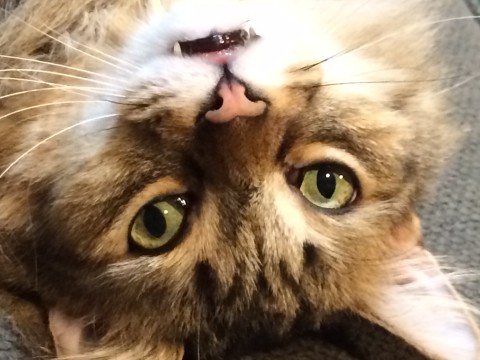Cat bites, even small ones, can be dangerous if they aren’t properly cared for. Cats’ teeth are so sharp that they can create deep puncture wounds fairly easily, making them a bit more dangerous than scratches. This is especially true when your cat bites in anger or fear, because she’ll bite hard. However, playful nips and love bites can be dangerous if they break skin, too.
Cat bites are puncture wounds
Some people who’ve suffered deep cat bites are hospitalized (paywall), and need their bite wounds cleaned out surgically. Others don’t necessarily need the wound cleaned that way, but still need hospitalization to treat the resulting infection. While dog bites are also very serious, dogs don’t have the needle-like teeth that give cats the ability to insert bacteria deep into your flesh like an injection. This is what makes cat bites so dangerous.
What can you do to treat cat bites at home?
If a cat bites you, the wound will probably be small and may or may not bleed a lot. But that doesn’t mean it doesn’t need attention. You should wash the wound under running water, but don’t scrub at it. VCA Vet Hospitals recommends also using a salt solution, made with one teaspoon of table salt with two cups of water. Try not to use harsh chemicals, like alcohol or hydrogen peroxide, more than once because they can further damage the skin and hinder your body’s ability to heal the wound.
If the cat that bit you is yours, and she’s indoor-only, keep an eye on the bite, and wash it regularly under running water with soap. Keep it covered, and consider putting dabs of Neosporin on the bandage. If you notice swelling, numbness, or ongoing pain, see your doctor immediately.
If the cat was stray or feral, or your cat goes outdoors without your supervision, you should go see your doctor immediately after cleaning and covering the bite. This is because there’s a risk of rabies, along with all the other risks associated with cat bites. Your doctor might want to prescribe an oral antibiotic, and recommend that you go through the rabies series to prevent a rabies infection.
If your cat bites you regularly, what can you do to help her stop?
If you’re having a problem with your cat biting you, there are things you can do to help end it. If she bites you while playing, then be sure she has a wide variety of toys that she likes. She can bite those to her heart’s content, and you don’t get hurt. Play with her for about 10 to 15 minutes at a time, at least twice a day, so she’s expending energy on approved activities. This will help ensure she doesn’t feel like using your hands and feet (or other cats) as her toys.
You can also make sure she always has new things to explore and play with. Don’t throw boxes out, or collapse them and put them away immediately. Cats love investigating boxes, and it gives her something new to explore in a house that she’s too familiar with. Putting herbs, like dried catnip, spearmint, or even pumpkin spice, inside a paper bag and then crumpling it up can also give her something that will entertain her for awhile. Mix up the herbs you use so that they smell different to her. That’ll make her think she’s always got new toys.
Another thing you should do is get up and walk away from your cat if she does start to scratch and bite you while you’re playing with her. Teach her that behavior won’t be tolerated. Eventually, she’ll learn that she’s only to attack the toys you give her.
What if a cat bites you out of aggression?
If she’s biting out of aggression, you should call your vet and get her looked at, especially if this is new behavior for her. Aggressive biting can be a sign of pain or illness, and you’ll want to make sure that isn’t the case. If your vet can’t find anything wrong, then you might consider hiring a behaviorist to come and evaluate her. A behaviorist can help you can eliminate whatever’s frightening or angering her, and start working on helping her to feel calm, safe, and at peace again.




